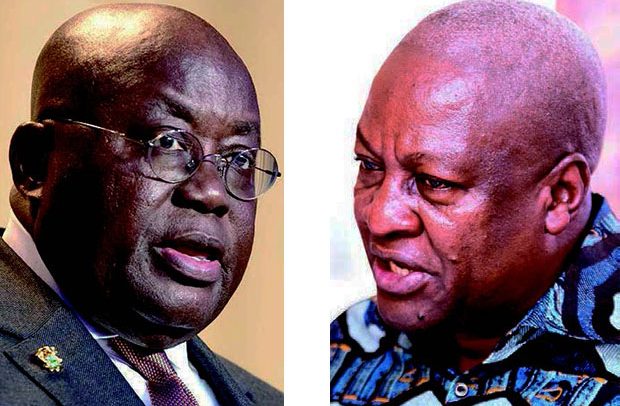President Akufo-Addo and John Dramani Mahama
Majority of Ghanaians polled in a recent Afrobarometer survey still have appetite for the governing New Patriotic Party (NPP).
In the latest Afrobarometer poll, the respondents say they prefer voting for the NPP to returning the opposition National Democratic Party (NDC) to power.
In the survey report released in Accra on Monday by the Afrobarometer team led by the Ghana Centre for Democratic Development (CDD-Ghana), when respondents were asked which party candidate they prefer voting for, 34 per cent tipped NPP, while 22 per cent rooted for the NDC, an indication that NPP is still the choice of the majority.
The poll suggested that the 2020 elections may record voter apathy, looking at the percentage of undecided voters or those who claim they may not exercise their franchise at all.
“When asked which party’s candidate they would vote for if presidential elections were held the following day, more than four in 10 Ghanaians (42%) said they would not vote (11%), did not know (12%), or refused to answer the question (19%),” the report said.
“Among respondents who declared a preference, the NPP maintained a lead over the NDC, though its lead had shrunk by 15 points compared to survey responses in 2017,” it added.
Even though the NPP is losing some grounds, according to the polls, going by previous Afrobarometer poll in 2017, it has not been translated to votes gained by the NDC, which is still maintaining a distant second.
The NDC is taking solace in the hope that undecided voters may swing in its favour.
For the two parties, the jury is still out as they can draw up convincing programmes to convince and attract the huge undecided voters.
One interesting revelation in the latest Afrobarometer poll which was conducted in September-October 2019 is the number of youth who have lost interest in the electoral process.
“Youth were twice as likely as older citizens to say they would not vote (14% of those aged 18-35 vs. seven per cent of those aged 56 and above), as were urban residents (15%) compared to rural residents (seven per cent) ,” the report indicated.
The two leading parties appeared to have shared the 16 regions equally.
According to the report, among declared voters, the NPP and NDC both held leads in eight out of the 16 regions, with the NDC generally more popular in the newly created regions.
By Fortune Alimi

